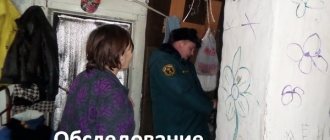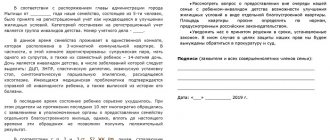The right of a Russian to own housing is ensured by Article 40 of the Constitution of the Russian Federation. It also says that it is provided free of charge to low-income people. The reason for issuing square meters is poor living conditions. But not everyone who is in such conditions receives apartments from the state - sometimes due to bureaucratic difficulties, sometimes due to the intentions of officials, and sometimes through their own fault. If you encounter such a problem, contact our agency for legal advice.
When is housing considered unsuitable?
The main criterion for recognizing living conditions as inadequate is that the area of the premises is too small. In St. Petersburg, one person is entitled to at least 9 square meters. m of total area of the apartment. That is, for a family of three people - at least 27 square meters. m.
In addition, there is Decree of the Government of the Russian Federation No. 47, which contains requirements for residential premises, among which are the following points:
- integrity of load-bearing structures and floors;
- serviceability of engineering systems;
- humidity not more than 60% and average temperature not less than 18 degrees;
- presence of windows in the apartment;
- placement of living space not in the basement or attic.
If your apartment is too small for your family and you have been living in St. Petersburg for more than 10 years, you can apply for real estate from the state. Applications are reviewed by the Housing Commission, a permanent division of the administration of each district. One of the commission’s tasks is to find out whether there was a deliberate deterioration of living conditions.
Unconscious violations
It also happens that an individual applying for social assistance becomes a violator unknowingly. For example, a gift in favor of the state is not a basis for obtaining new housing, since legally this is not a deterioration in living conditions. When assessing illegal actions of citizens, the time of their implementation must also be taken into account. It is absolutely normal for a spouse to be discharged from her previous place of registration and registered in her spouse’s living space. When registering, young children are also registered there with her. However, when the same action is carried out several years after the date of registration, in order to worsen living conditions and obtain new housing, this will serve as grounds for refusal, since such actions are unlawful.
The presence of temporary residents is not the basis for receiving social assistance. In any case, the decision of the civil service will be made only after conducting an in-depth, thorough analysis of each applicant's situation. There are more than enough people in need, so their rights cannot be allowed to be infringed while unscrupulous individuals take advantage of what they are not entitled to.
In what cases are they excluded from the housing queue?
In the hope of a more spacious apartment, a family can sell their home and buy a tiny room. Or transfer it to your parents and rent an apartment for yourself. But such actions fall under Article 53 of the Housing Code of the Russian Federation, which regulates liability for the deliberate deterioration of living conditions. This is the name for any transactions that result in a shortage of space: sale, transfer for free use, donation, exchange. It is also prohibited to transfer an apartment to non-residential premises, a fictitious divorce, or move relatives into your space (except for situations where they really have nowhere else to live).
If a family is caught deliberately deteriorating their housing conditions, they will have to wait five years before submitting a new application, which the housing commission can approve.
Video consultation
In the video below, lawyer Oleg Sukhov explains what to do if free rooms in a communal apartment were denied, despite the fact that the living conditions of the residents have worsened.
The state has established very strict conditions for citizens to get on the waiting list. To qualify for social assistance, you must submit documents that give you the right to do so and confirm the deterioration of your living conditions. Since the latter is a priority, judicial practice shows that cases where citizens deliberately worsen their living conditions have become more frequent.
In connection with the current circumstances, such a concept as the deliberate deterioration of housing conditions arose, which received a legal basis after the new Housing Code of the Russian Federation came into force in 2005. Thanks to changes in its articles, today it is possible to refer to certain points that clarify which actions are considered intentional.
Intentional deterioration of housing conditions, as a separate, independent concept, appears in the Housing Code, but the very essence of the concept is not legally disclosed. If government agencies can identify and confirm that citizens’ actions were unlawful, then violators can be held accountable. Often the preventive measure is a ban on joining the queue again for several years.
Dear readers!
Our articles talk about typical ways to resolve legal issues, but each case is unique. If you want to find out how to solve your specific problem, please contact the online consultant form on the right →
It's fast and free!
Or call us by phone (24/7):
Deterioration of living conditions - especially for military personnel
Disputes about the deterioration of living conditions by the military are regulated by Order of the Minister of Defense No. 1280. It lists the same conditions for refusing to provide an apartment to the military. You can also re-apply for an apartment after five years.
The same document states which actions of military personnel do not deprive them of the right to free housing:
- moving in relatives who do not have living space;
- marriage;
- termination of the rental agreement at the request of the lessor;
- reunification with children;
- the real estate transaction was declared invalid, which led to the loss of housing.
Who's in line
If the deterioration of housing conditions is not intentional, individuals retain the right to get on the waiting list to receive social assistance from the state.
Circumstances that give grounds to remain in the preferential category:
- A documented fact of moving in relatives who have lost their housing;
- Reducing the number of square meters per person when a child is born in a family;
- Loss of living space as a result of a natural disaster (priority right).
Since the definitions in the Housing Code of the Russian Federation are currently very vague, citizens have the opportunity to turn almost any case to their advantage, with sufficient awareness or contacting a competent lawyer. The main role will be played by documentary evidence that the actions were not intentional.
In general, the preferential categories that have the right to apply for improved living conditions are considered to be low-income people, police officers, military personnel and government service employees. In the case of social rent or free use, the queue moves quite slowly, and will regularly move with the arrival of someone who has more documented reasons to move forward without waiting.
What is said in this regard in the law of St. Petersburg
Each region has its own legal acts defining liability for deterioration of living conditions. In St. Petersburg, this is Law No. 409-61, where Article 3 lists the grounds for refusal to provide an apartment:
- division or exchange of real estate;
- the entry of strangers;
- alienation of premises;
- eviction of a citizen by court decision for failure to comply with a social tenancy agreement;
- termination of the contract at the initiative of the employer.
It also says that St. Petersburg residents who received a new apartment from the city and then deliberately worsened their living conditions must wait 10 years before submitting a new application.
The regional law also contains an important clarification: moving spouses and minor children into an apartment is not an intentional deterioration of living conditions. Therefore, a family whose apartment has become cramped because a child was born can safely apply for new housing.
How to distinguish intentional acts from freedom of choice
If a family lives in an apartment whose total area does not correspond to the current registration norm for each tenant in the region, then it has the right to be registered as housing requiring improvement. At the same time, residents retain the constitutional right to choose their place of residence - the apartment can be exchanged, sold or donated.
If the exchange of an apartment for a smaller one occurred during the period when its owner was registered in the queue for new housing, then there is no need to talk about deliberate deterioration. This is where the exercise of freedom of choice takes place.
The deliberate deterioration of housing conditions will be evidenced by the fact of an exchange for a smaller apartment if, as a result of the transaction, the citizen is recognized as in need of improved housing and is put on the waiting list.
Judicial practice, when considering the issue of deliberate deterioration of housing conditions, is based on the principle of reasonableness and good faith in the actions of participants in civil legal relations.
In housing legislation, deterioration is considered only as a decrease in the level of provision of each family member with square meters, regardless of the quality of the apartment, the number of isolated rooms, or the level of amenities.
For example, a citizen lives in an apartment consisting of two rooms with his parents, and the family does not need to improve living conditions. After the marriage, it was decided that the young family would live with the bride’s parents in a three-room apartment and the man would be registered at his place of residence. As a result, the level of provision of living space in the bride’s apartment changed downward, and they received the right to be registered as those in need of a new apartment.
From the point of view of Art. 53 of the Housing Code of the Russian Federation, the actions of citizens can be regarded as a deliberate deterioration of living conditions. However, the principle of reasonableness, embodied by the court, may interpret actions to move and register an additional family member as a manifestation of freedom of movement and place of residence. Taking into account the fact that the second apartment has more rooms and the young family will be allocated a separate living space, the husband’s registration cannot be regarded as an artificial move to deliberately change living conditions for the worse.
In this example, the young family did not allow actions to deliberately worsen their living conditions and has the right to submit a package of documents for participation in the state program.
Accused of intentionally worsening living conditions - how to challenge?
A common situation is when people did not know that their actions fell under the definition of Article 53 of the RF LC. For example, one of the family members gives a share of the apartment in which he lived before marriage to his parents. Then the family tries to get on the waiting list for housing from the state, but is refused. And it doesn’t matter that having a share in the apartment did not improve the situation of this family in any way - the area was too small for living together with their parents.
But if the housing commission refused registration without reason, justice can be restored through the court. Contact us and you will receive:
- legal advice on housing law;
- assistance in drawing up a statement of claim;
- defense in court.
Arbitrage practice
Let's look at some illustrative cases.
In 2008, a military board found that the citizen standing in line took certain actions to make his conditions worse than they actually were. In 2001 he purchased a three-room apartment. Further, the mother of this person was registered at this address. After 4 years, the apartment was sold to her. At the same time, the buyer himself, along with his wife and two children. In 2007, the serviceman was removed from the queue to receive an apartment. According to the court decision, the actions of this person were recognized as unlawful.
Another incident occurred in 2007. A citizen of the Russian Federation filed a lawsuit who wanted to challenge the decision of the commission that refused to register her. The citizen was refused due to the deliberate deterioration of conditions. The fact is that several years before registering, she gave her 3-room apartment to her daughter. Afterwards, I purchased a one-room apartment for myself and registered my other two children and, after another year, my newly-made husband there. In relation to the latter, the commission suspected a fictitious marriage. The case was lost and the court decision only confirmed the correctness of the commission’s refusal. The fact of specially taken actions to worsen living conditions was recognized.
Court decisions
On your own rake: what nuances should not be forgotten when it comes to the housing issue
The apartment does not meet sanitary requirements
Unwanted neighbor: how to defend your rights to an apartment?
Apartment disputes: eviction of a family member
Dispute with a housing construction cooperative
How to peacefully resolve housing issues
How conditions are improving
- To improve these conditions, you need to register.
- Next, documentation is prepared and submitted to the administration of a specific subject of the Russian Federation.
- Then you just have to wait for a decision to be made.
- If it is positive, then the family gets on the waiting list or receives a subsidy.
How to register
According to Article 52 of the Housing Code, registration of people is carried out only if the appropriate conditions exist.
This requires supporting documents, which can be represented by the following documents:
- income certificate indicating that citizens are low-income, and this includes families in which 4 people have less than $300;
- a certificate from the house register, which indicates the number of citizens registered in the housing, as well as the square footage of the apartment, so you can calculate how many square meters there are per 1 resident;
- a certificate from the Unified State Register of Real Estate confirming that the person does not have his own home;
- a decision of the housing commission, which indicates that a particular property is indeed in disrepair;
- a medical certificate, based on which it is clear that a person with a chronic and contagious disease lives in the same property with the applicant and members of his family, therefore constant presence near him is dangerous for citizens.
Important! It is imperative that all family members receive income certificates from their place of work so that they can determine how much money the family receives per month.
When determining the level of income, not only cash receipts are taken into account, but also existing property is assessed.
Sample act of inspection of housing conditions.
The documentation is reviewed for one month, after which applicants receive a written response. Based on Art. 54 of the LC, it is possible to challenge a negative decision, for which you need to go to court.
Article 54. Refusal to register citizens as those in need of residential premises
1. Refusal to register citizens as those in need of residential premises is permitted if:
1) the documents provided for in Part 4 of Article 52 of this Code, the obligation to submit which is assigned to the applicant, have not been submitted;
1.1) the response of a state authority, local government body or an organization subordinate to a state authority or local government body to an interdepartmental request indicates the absence of the document and (or) information necessary for registering citizens as those in need of residential premises in accordance with Part 4 Article 52 of this Code, if the relevant document was not submitted by the applicant on his own initiative, except for cases where the absence of such requested document or information at the disposal of such bodies or organizations confirms the right of the relevant citizens to be registered as those in need of residential premises;
(clause 1.1 introduced by Federal Law dated December 3, 2011 N 383-FZ)
2) documents have been submitted that do not confirm the right of the relevant citizens to be registered as those in need of residential premises;
3) the period provided for in Article 53 of this Code has not expired.
2. The decision to refuse registration must contain the grounds for such refusal with a mandatory reference to the violations provided for in Part 1 of this article.
3. The decision to refuse registration is issued or sent to the citizen who submitted the corresponding application for registration no later than three working days from the date of such decision and can be appealed by him in court.
Typically, the refusal is due to the fact that living conditions were deliberately worsened by people, and also that citizens have fairly high incomes. If the refusal is unfounded, it can be challenged in court.
What documents are needed
Registration, which makes it possible to improve the conditions in which people live, is carried out on the basis of certain documentation.
It includes:
- passports or birth certificates of all family members;
- the applicant's marriage certificate;
- an extract indicating the composition of the family;
- title papers for real estate if it belongs to the family;
- registration certificate for real estate;
- certificate of availability of valuable property, represented by dachas, garages or cars;
- certificate from the BTI for housing;
- information about the cadastral price of the property;
- income certificates.
Important! The full number of documents can be obtained from the administration staff.
Customer Reviews
Review by Irina D. I thank the Legal Agency of St. Petersburg for the warm, sincere welcome and the detailed, competent, thorough, conscientious legal position of lawyer Andrei Valerievich.
Gratitude to the team I express my gratitude to the legal team. department of St. Petersburg. for the service provided in terminating the loan agreement for the purchase of space. funds that I had the imprudence to enter into with one of the unscrupulous companies. The lawyers responded quickly, paid a visit to the company and filmed it. Once again I express my endless gratitude and wish you continued prosperity.
Customer Feedback We thank the employees of Legal Agency of St. Petersburg LLC and, first of all, Yana Maksimovna Matveeva and Andrey Valerievich Ermakov for their highly qualified and thorough consideration of our issue and the prompt solution to our housing problem.
Also to Daria Valentivna Kutuzov for her attentive and friendly attitude towards visitors.
Feedback from Solovyova I would like to express my deep gratitude to lawyer Konstantin Vasilyevich Solovyov for his qualified assistance in resolving my issue. The decision was made in my favor, for which I am very grateful. I would also like to express my gratitude to the company’s team for their sensitive attitude towards clients.
Gratitude from Potapova T.I. I express my gratitude to Denis Yuryevich Stepanov for the work done, high qualifications, as well as for very clear, accessible help in solving my problem (protection of consumer rights). Excellent, very competent lawyer. Thank you very much!
Sincerely, Potapova Tamara Ivanovna, 07/09/2019
Thanks to Stepanov D.Yu. I express my deep gratitude to lawyer Denis Yuryevich Stepanov for his high professionalism and attentiveness to his case when considering the issue in word with a contractor who improperly completed the work of erecting a screw foundation. The cost of the work amounted to 178,300 rubles. And the court of the Vyborg district (Case No. 2-1432/2018) dated March 12, 2018) to collect, taking into account all fines, 504,800 rubles. Once again, I thank you and wish you success in your future work and only successful business conduct.
Grateful to you, your client. 05/18/18
Gratitude to Kavalyauskas V.A. from Astafieva A.S. I express my gratitude to the Legal Agency and in particular to lawyer Vasily Anatolyevich Kavaliauskas for the skillfully done work. Vasily Anatolyevich advised and prepared all the documents necessary for court proceedings. As a result of the consideration of the consumer rights case, the result and the high amount exceeded all my expectations. Thank you very much for your qualified work and professionalism.
Sincerely, Astafieva A.S., 03/01/2019
Feedback from Goncharova I, Venera Konstantinovna Goncharova, express my gratitude to Andrey Valerievich Ermakov, Yana Maksimovna Matveeva, Daria Vasilievna Kutuzova and the entire team. I would like to note that the work was completed within the agreed time frame and with good quality. They showed a professional approach and excellent organization of work. I would like to express my gratitude to the entire team for their high-quality work and wish you further development of your company.
Sincerely, Goncharova Venera Konstantinovna.
Gratitude from N.S. Khokhlov I am Khokhlov N.S. I express special gratitude to lawyer A.V. Pavlyuchenko who defended my consumer protection rights. I was pleasantly surprised by his professionalism, where he discovered the false address of my defendant registered in the Unified State Register of Legal Entities, and also defended me, as I believe, from the unreasonable decisions of the trial judge. If I need legal assistance in the future, I will only turn to A.V. Pavlyuchenko.
N.S. Khokhlov December 12, 2017
Gratitude from gr. Tiuntsova G. A. I asked for advice from your “Legal Agency of St. Petersburg” - regarding deception by one person who presented himself as an employee of Rospotrebnadzor of the Krasnoselsky district, Novichkov A. A. Offered me a service - before the New Year, go on a tourist trade union voucher to Moscow on the Sapsan railway transport. I refused due to the manipulation of the placement of seats - in different trains, and then by car. Lawyer Sergei Vyacheslavovich Mavrichev handled this case and provided consultations. I thank you for such a sensitive and attentive attitude in office work, which was denied at the 58th police department of the Vyborg district, under Art. 24, 144, 145 of the Code of Criminal Procedure of the Russian Federation, I now have the right to appeal the conclusion and will send an application for further investigation to the district prosecutor's office.
Tiuntsov G. A.
8
Housing conditions of the Russian population indicators (Table)
Housing stock is the totality of all residential premises located on the territory of the Russian Federation. The total area of a residential premises consists of the sum of the area of all parts of such premises, including the area of auxiliary premises intended to satisfy citizens' household and other needs related to their residence in residential premises, with the exception of balconies, loggias, verandas and terraces. The total area of residential premises per inhabitant on average is calculated by dividing the size of the entire housing stock at the end of the year by the size of the resident population at the same date.
Apartment is a structurally separate room in an apartment building, providing direct access to the common areas in such a house and consisting of one or more rooms, as well as auxiliary premises intended to satisfy citizens' household and other needs related to their residence in such a separate apartment indoors.
Main indicators of housing conditions of the Russian population by year table
| Indicators of living conditions of the population | 1995 | 2000 | 2005 | 2008 | 2010 | 2015 | 2017 | 2018 | 2019 |
| Total area of residential premises per inhabitant on average (at the end of the year) - total, m2 | 18,0 | 19,2 | 20,8 | 21,8 | 22,6 | 24,4 | 25,2 | 25,8 | 26,3 |
| from her: | |||||||||
| in urban areas | 17,7 | 18,9 | 20,4 | 21,4 | 22,1 | 24,0 | 24,8 | 25,4 | 25,9 |
| in the countryside | 18,7 | 19,9 | 21,9 | 22,9 | 24,0 | 25,6 | 26,6 | 26,9 | 27,3 |
| Number of apartments - total, million. | 52,0 | 55,1 | 57,4 | 59,0 | 60,1 | 64,0 | 65,9 | 66,9 | 67,5 |
| of them: | |||||||||
| one-room | 12,1 | 12,8 | 13,3 | 13,7 | 14,1 | 15,4 | 16,2 | 16,6 | 17,0 |
| two-room | 21,9 | 22,6 | 23,2 | 23,6 | 23,9 | 24,9 | 25,5 | 25,7 | 25,8 |
| three-room | 15,0 | 16,2 | 16,8 | 17,2 | 17,4 | 18,2 | 18,6 | 18,7 | 18,8 |
| four-room or more | 2,4 | 3,5 | 4,1 | 4,5 | 4,7 | 5,2 | 5,3 | 5,4 | 5,6 |
| Average size of one apartment, m2 of total living area | 47,7 | 49,1 | 50,4 | 51,8 | 52,8 | 54,6 | 55,3 | 55,7 | 56,2 |
| one-room | 31,7 | 32,0 | 32,3 | 32,9 | 33,4 | 35,0 | 35,7 | 35,8 | 36,2 |
| two-room | 44,7 | 45,4 | 45,7 | 46,5 | 47,1 | 48,3 | 48,9 | 49,1 | 49,4 |
| three-room | 59,3 | 60,4 | 61,0 | 62,3 | 63,2 | 65,2 | 66,1 | 66,4 | 66,9 |
| four-room or more | 77,3 | 82,6 | 91,8 | 97,5 | 101,8 | 104,5 | 106,9 | 107,9 | 110,2 |
| Share of the number of families registered as needing residential premises in the total number of families (at the end of the year), percent | 15,0 | 10,9 | 6,5 | 5,6 | 5,5 | 4,7 | 4,4 | 4,3 | 4,1 |
| Capitally renovated premises in apartments of residential buildings per year, thousand m2 of total area | 11666 | 3832 | 5552 | 12381 | 8660 | 4340 | 8700 | 14259 | — |
| Residential premises privatized (since the beginning of privatization, as of the end of the year): | |||||||||
| total, thousand | 12479 | 17351 | 23668 | 26442 | 28459 | 30557 | 30901 | 30982 | 30985 |
| as a percentage of the total number of residential premises subject to privatization | 36 | 47 | 63 | 70 | 75 | 77 | 81 | 82 | 82 |
Note:
Due to the absence of a regulatory legal act establishing the procedure for state accounting of the housing stock in the Russian Federation, including its state technical accounting (including technical inventory), official statistical information on the housing stock since 2013 has not been compiled for a full range of accounting units;
Starting from 2021, information on major repairs of the common property of apartment buildings is being developed in the system of the Russian Ministry of Construction.
Number of families who received housing and improved living conditions
| Indicator of living conditions of the population | 1995 | 2000 | 2005 | 2008 | 2010 | 2015 | 2017 | 2018 | 2019 |
| Number of families (including singles) who received housing and improved living conditions during the year: | |||||||||
| thousand | 652 | 253 | 151 | 144 | 244 | 135 | 123 | 99 | 106 |
| as a percentage of the number of families registered as needing residential premises | 8 | 4 | 4 | 5 | 9 | 5 | 5 | 4 | 4 |
Number of families registered for housing
| Indicator of living conditions of the population | 1995 | 2000 | 2005 | 2008 | 2010 | 2015 | 2017 | 2018 | 2019 |
| Number of families (including singles) registered as needing residential premises (at the end of the year): | |||||||||
| thousand | 7698 | 5419 | 3384 | 2864 | 2818 | 2612 | 2458 | 2364 | 2267 |
| as a percentage of the total number of families (including singles) | 15 | 11 | 7 | 6 | 5 | 5 | 4 | 4 | 4 |
Emergency housing stock of Russia
Total area of residential premises at the end of the year.
| Indicator of living conditions of the population | 1995 | 2000 | 2005 | 2008 | 2010 | 2015 | 2017 | 2018 |
| Emergency housing stock, million m2 | 4,9 | 9,5 | 11,2 | 16,5 | 20,5 | 19,6 | 24,6 | 25,5 |
| Share of emergency housing stock in the total area of the entire housing stock, percent | — | 0,3 | 0,5 | 0,5 | 0,6 | 0,5 | 0,7 | 0,7 |
_______________
A source of information:
Consequences of intentional actions of spouses
Based on Art. 53 of the Housing Code of the Russian Federation, administration specialists may refuse to provide an applicant with municipal property under a social tenancy agreement. You will also be denied the opportunity to register for 5 years. But this is only administrative responsibility.
- fine up to 300,000 rubles;
- correctional labor up to 480 hours;
- restriction of freedom up to 1 year;
- imprisonment for up to 5 years.
Before getting a divorce, you need to understand what the consequences may be in the future. It is strongly recommended not to resort to fraudulent activities, as they rarely go unpunished.





